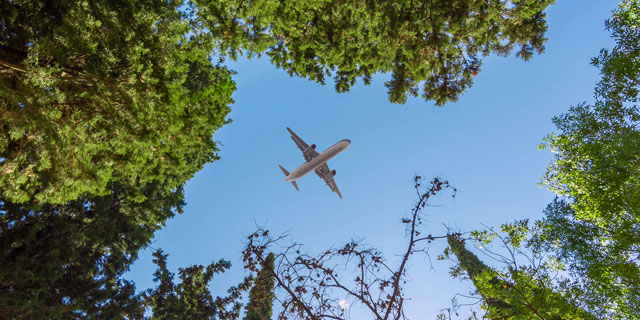Please join us in welcoming Barry Choi as a contributor to the Oaken Blog. Barry is a well-known personal finance and travel expert, and a regular guest on some of Canada’s largest media outlets. You can follow Barry on his personal site moneywehave.com or reach out to him on Twitter @barrychoi.
In his first article for the Oaken Blog, Barry lets you in on some of the tips he’s learned over the years to help make travel a little more affordable. His insights are sure to help you save money on your next trip.
One of the biggest misconceptions is that travel is expensive, but with a little planning, it doesn’t have to be. Yes, you could spend a small fortune on a luxury cruise, but you could also spend much less by visiting some more exotic countries. How you spend your travel dollars is up to you, but the following 10 tips have saved me thousands of dollars over the years:
1. Be flexible
This isn't a secret, but if you fly between Tuesday and Thursday, you can typically find flights cheaper compared to those departing from Friday-Monday. The time of day your flight departs can also affect your bottom line. Morning flights or the last flight out typically cost more than, say, late morning or mid-afternoon flights. I also try to travel during the spring or fall as travelling in these off-peak times can often save me up to 25% on flights and hotels, versus travelling during the summer.
2. Choose a cost effective destination
The reality is that some destinations are much cheaper than others. A recent flight to Thailand cost me about $1,100, but then I was spending less than $75 a day on the ground, which included accommodations, meals and attractions. My wife and I travelled to Portugal for a week a few years back, and it cost us only $2,000 (flights included). That was less than half of what we spent on a trip to London the year before. Visiting value destinations has always been an incredible experience for us.
3. Bundle your travel expenses
What many people don't realize is that if you're looking for flights, hotels and car rental, you can usually save when arranging everything online as a package through travel booking sites such as Expedia.ca. At first, I didn't think I would save any money by bundling, but I priced everything out separately when planning a trip to Orlando and realized I could save about $250 by booking everything together. The best part is, I didn't need to book everything all at once to get the deal. I booked my flight first and then added my accommodations and car rental later and still got the savings.
4. Consider alternative accommodations
When I'm looking for something a bit different, I typically book my travel through booking.com. What makes this site so appealing is that I can secure varied accommodations including houseboats, tree houses, serviced apartments and even luxury tents. They have regular hotels too, but I like how booking.com gives me so many different options.
Since I can search by price and location, it's not difficult to find something unique without having to spend a fortune. They've also recently introduced tickets for local attractions which are sometimes great deals, and even offer additional perks such as priority lines.
5. Watch those currency fees
Currency exchange fees are a hidden cost, but now there are different ways to save. I always carry a credit card that doesn't have foreign transaction fees. This can save 2.5% on every foreign transaction you make.
If I need cash, ATMs are the quickest way to get it, but they often come with a fee of up to 3.5%, plus any one-time fees they may charge. To cut back on those fees, I'll exchange money at any place (e.g. the bank or currency exchange office) where the cost is 2.5% or less.
6. Know your credit card benefits
As someone who travels often, I rely quite a bit on my credit card travel benefits. Travel insurance is the most important thing to me because that saves me $150-$300 every year. I've also taken advantage of other travel insurance that my card offers, such as trip cancellation which saved me almost $5,000. My credit card also gives me unlimited lounge access, where I estimate I save another $500 per year. My card does come with an annual fee, but the benefits I get are worth much more than what I pay each year in fees.
7. Collect loyalty points
I've been collecting loyalty points for almost two decades and have made some incredible redemptions, including business class flights to Asia and free nights at a luxury hotel in Rome during my honeymoon. Loyalty programs are free to join, so there's no reason not to sign up, but it’s key to try to maximize the points you earn.
I typically try to use one airline and hotel chain so I'm earning points for the same program. I also use a co-branded credit card which allows me to earn points fast. I take things a step further by examining loyalty programs to see what's the best value for my points. That might require me to save up my points, but I'll end up saving big in the long run.
8. Eat like a local
I love to eat but eating out every meal would destroy my travel budget. As soon as I arrive at my destination, I'll head to the local grocery store to pick up essentials like water and snacks. I'll also buy groceries if I have access to a kitchen. Even if I can't cook, prepared meals are still much cheaper than going to restaurants. That said, I do enjoy eating out, I just don't do it every day. I also research in advance to see what restaurants locals eat at as opposed to ones that cater to tourists, since they're usually cheaper and better tasting.
9. Find free/cheap things to do
Every destination I've been to has free things to do. From museums to walking tours, I've spent days in cities without spending a single dollar on attractions. I check the official tourism board website first, as they always have a page dedicated to free or cheap things to do. I'll also check museum and art gallery websites directly, as they often have a free or discounted day available. Many cities also offer a museum or city pass which can save money. Before I purchase one, I always do the math to ensure the attractions I'm interested in actually cost more than the pass.
10. Look into local transportation
Transportation is one of my biggest expenses when I travel, so I try to save where I can. Instead of taking taxis or rideshares, I'll look up how to use public transportation to help me save money. Of course, time is money, so I always gauge how much I'm saving versus how many hours I'm spending in transit.




 Travel and lifestyle
Travel and lifestyle